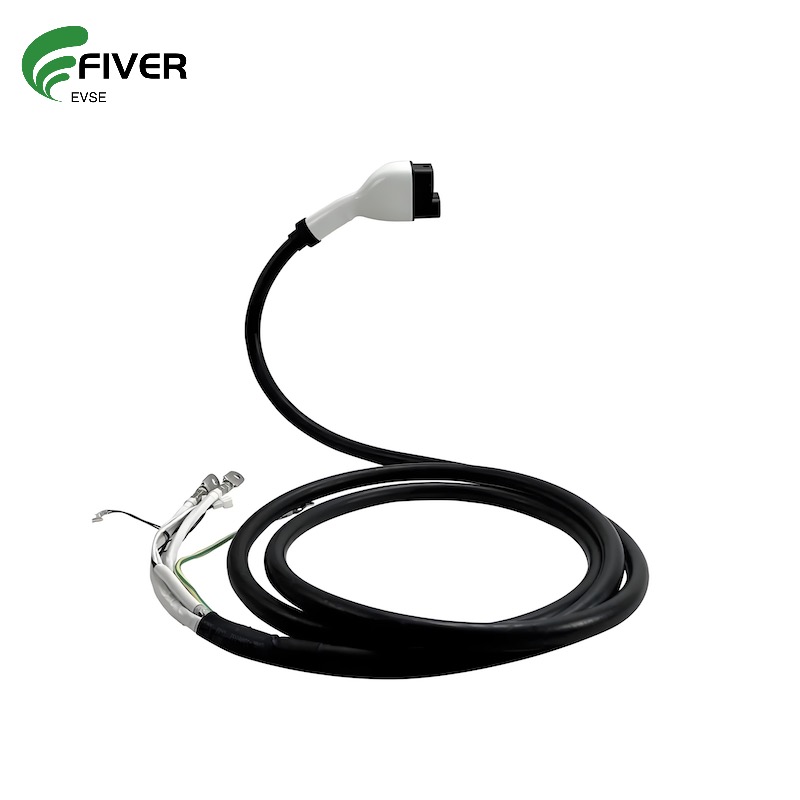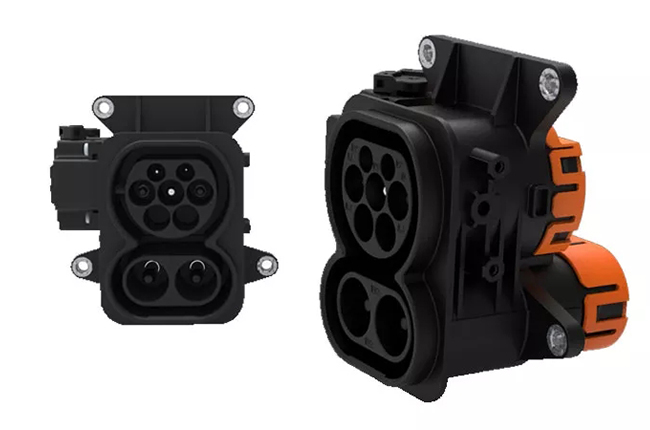Industry news
What is a CCS2 Charger? Fast & Ultra-Fast EV Charging Solution | Fiver New Energy

Introduction:
As electric vehicles (EVs) surge in popularity worldwide, the demand for efficient, high-speed charging infrastructure has never been greater. At Fiver New Energy Co., Ltd., we are at the forefront of this revolution, delivering CCS2 fast and ultra-fast charging solutions that redefine reliability and performance. In this guide, we’ll delve into the intricacies of CCS2 technology, explore its advantages over older systems, and showcase how our products—from CCS2 connectors to liquid-cooled charging cables—are powering the next generation of EVs.
Understanding CCS2 Charging
CCS2 charging (Combined Charging System Type 2) is the gold standard for EV charging across Europe, Asia, and Oceania. Unlike fragmented charging systems, CCS2 integrates AC and DC power delivery through a single, streamlined CCS2 plug, ensuring compatibility with nearly every modern EV. Key components include:
- CCS2 Connector: A charging connector engineered for high-power DC charging, reducing downtime for drivers.
- CCS2 Charging Cable: Available in air-cooled (80A–400A) and liquid-cooled (500A–800A) configurations to meet diverse power needs.
- CCS2 Charging Port: The universal inlet on EVs that accepts CCS2 connectors, designed for durability and safety. A combination of AC and DC charging.
This unified approach simplifies infrastructure development, making CCS2 the preferred choice for governments and automakers alike.
The Evolution of the Combined Charging System (CCS)
The Combined Charging System (CCS) was developed to eliminate the confusion of multiple charging standards. CCS2, in particular, combines the Type 2 AC connector (commonly used in Europe) with two additional DC pins, enabling ultra-fast charging. Its benefits are clear:
- Global Standardization: Over 90% of non-Tesla EVs in Europe and Asia rely on CCS2. (the rest adopt the ChAdemo connectors or CCS1)
- High Efficiency: Supports power outputs over 350 kW, cutting charging times by 50% compared to older systems.
- Scalability: Designed to accommodate future advancements in battery technology.
CCS1 vs CCS2: Breaking Down the Differences

While CCS1 (used in North America) and CCS2 share the same foundational technology, critical distinctions impact their regional adoption:
| Feature | CCS1 | CCS2 |
| Connector Design | Type 1 (J1772) | Type 2 (Mennekes) |
| Primary Market | North America | Europe, Asia, Oceania |
| Max Power | 350 kW | 350 kW+ (liquid-cooled) |
| EV Compatibility | Limited to CCS1 vehicles | Broad OEM support |
CCS1 is mainly used in North America (USA, Canada, Mexico) and South Korea, while CCS2 is widely adopted in Europe, Australia, New Zealand, parts of Asia (including India, Singapore, Taiwan, Hong Kong), South America, South Africa, Arabia, Greenland, and Iceland.
The other major difference, is their AC charging capacity, for CCS1 it supports 1-phase AC charging. max current 80A, max capacity is 240V*80A=19.2KW, While CCS2 supports 3-phase AC charging, max current 63A, max charging capacity is up to 43KW.
For businesses expanding globally, CCS2’s widespread adoption makes it the smarter long-term investment.
CCS2 Charging Speed: What You Need to Know
CCS2 charging speed is a game-changer for drivers and fleet operators. Here’s how it works:
-
Cable Technology:
- Air-Cooled Cables (80A–400A): Ideal for urban fast-charging stations. Our latest 375A CCS2 charging cable, can charge continuously at 1000V 375A, at boost model it support 400A charging. ( at 400A in one hour, temperature rise less than 50K) ideal choice for rapid charge.
- Liquid-Cooled Cables (500A–800A): Minimize energy loss, enabling ultra-fast charging for highways and commercial hubs.
- Vehicle Compatibility: Newer EVs like the Hyundai Ioniq 5 and Mercedes EQS support 225–270 kW charging via CCS2.
- Grid Integration: Our chargers include smart load-balancing features to optimize power draw without straining local grids.
With Fiver’s liquid-cooled CCS type 2 charging cables, a 10–80% charge takes just 18 minutes for a 100 kWh battery—keeping fleets on the move and drivers on schedule.
Fiver New Energy’s CCS2 Solutions: Built for Excellence
As a one-stop provider of CCS2 charging infrastructure, we deliver end-to-end solutions tailored to your needs:
1. CCS2 Chargers
Our modular charging stations are designed for scalability, whether you’re equipping a retail parking lot or a highway rest stop. Features include:
- Dynamic power sharing between connectors.
- OCPP 2.0 compliance for seamless network integration.
2. CCS Type 2 Charging Cables & Connectors
- Air-Cooled (80A–400A): Rugged, flexible cables for high-traffic environments.
- Liquid-Cooled CCS2 Charging Cable (500A–800A): Engineered for extreme power delivery, reducing heat buildup by 40%.
3. CCS2 Charging Ports/Inlets

- IP67-rated for dust and water resistance.
- Compatible with all major EV brands, including BMW, Volkswagen, and Volvo.
- We have released the 600A CCS2 Charging Port Busbar version lately, Featuring a patented multi-layer copper-silver busbar, this inlet enables continuous 600A operation without liquid cooling, delivering true 5C charging capability with unmatched thermal stability.
All products meet IEC 62196 TUV and CE certifications, ensuring compliance with international safety standards.
Why Partner with Fiver New Energy?
-
One-stop Solutions: At Fiver New Energy, we simplify the future of electric mobility with end-to-end electric vehicle charging solutions tailored to your needs. Whether you’re a charging station operator scaling infrastructure, an EV charger manufacturer sourcing reliable components, or an EV owner seeking premium upgrades, we deliver a seamless, integrated ecosystem:
EV Charging Station Operators: Scalable CCS2 chargers, liquid-cooled cables (500–800A), and smart grid integration.
EV Charger Manufacturers: Certified CCS connectors, plugs, and CCS2 charging ports, liquid cooling units built for durability and compliance.
EV Owners: Future-ready home/commercial chargers with plug-and-play installation.
- Customization: Configure charging stations with dual CCS2 plugs, payment systems, or branding.
- Global Support: 24/7 technical assistance and a 2- 5 year warranty on all components.
FAQs: Answering Your CCS2 Questions
Q: Can CCS2 chargers work with older EVs?
A: Yes—most EVs with a CCS2 port are backward-compatible with Type 2 AC charging.
Q: How does liquid cooling improve CCS charging cables?
A: Liquid-cooled cables dissipate heat more efficiently, allowing higher current flow without degradation.
Q: Are CCS chargers suitable for cold climates?
A: Absolutely. Our connectors are tested to operate in temperatures from -30°C to 50°C.
Conclusion:
The shift to electric mobility is unstoppable, and rapid charge technology is leading the charge. At Fiver New Energy, we’re proud to offer robust, future-proof solutions—from CCS2 charging ports to ultra-fast charging cables—that empower businesses and drivers alike.
Ready to upgrade your charging infrastructure? Visit www.fiverevse.com to explore our product line, or contact our team for a personalized consultation. Together, let’s build a faster, cleaner future.
Categories
Latest News
Contact Us
Contact: Jerry Zhan
Phone: WhatsApp: +8618028699987
Tel: +86-023-20791348
Add: No.2201,AESC Center, Yubei District Chongqing China
